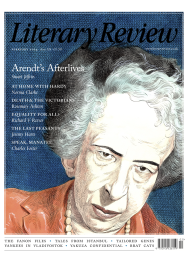Tim Hornyak
Tokyo’s Pensioner Hoods
The Last Yakuza: A Life in the Japanese Underworld
By Jake Adelstein
Corsair 416pp £25
‘As an investigative journalist, trouble is my business,’ Jake Adelstein, a reporter based in Tokyo, tells us in a typically Chandler-esque self-assessment. It’s one of many lines in The Last Yakuza that seem lifted from old Hollywood noir films. The Last Yakuza is the follow-up to Adelstein’s Tokyo Vice (2009), a memoir of his stint as a reporter for a Japanese newspaper that was turned into a successful HBO Max series.
In 1993, Adelstein became the first non-Japanese journalist to work at Yomiuri Shimbun, Japan’s largest daily newspaper. He covered criminal cases, including those involving the infamous gangs known as yakuza. In Tokyo Vice, he describes antagonising yakuza boss Tadamasa Goto for exposing a deal Goto had allegedly struck with the FBI to get a liver transplant in the United States in exchange for selling out mobsters. After receiving death threats, Adelstein says he hired Makoto Saigo (a pseudonym), another yakuza heavyweight, to be his bodyguard.
The Last Yakuza is billed as a biography of Saigo. Half-Japanese and half-American, he grew up on the outskirts of Tokyo, at first trying his luck in a rock band, then a motorcycle gang, and then a right-wing group, before finally finding his calling with a local yakuza affiliate. Saigo gained clout through financial scams and a willingness to inflict violence. He claims to follow a yakuza code of honour, something that elevates gangsters above common criminals, but indulges in methamphetamines, a violation of gang rules. It is a weakness that sets in motion his downfall.
The book romanticises a bygone era in the underworld. In their heyday, the yakuza infiltrated all levels of the Japanese economy, from real estate and the stock market to airport management and nuclear power. They were tolerated by the authorities for their role in maintaining Japan’s much-vaunted social order and

Sign Up to our newsletter
Receive free articles, highlights from the archive, news, details of prizes, and much more.@Lit_Review
Follow Literary Review on Twitter
Twitter Feed
It wasn’t until 1825 that Pepys’s diary became available for the first time. How it was eventually decrypted and published is a story of subterfuge and duplicity.
Kate Loveman tells the tale.
Kate Loveman - Publishing Pepys
Kate Loveman: Publishing Pepys
literaryreview.co.uk
Arthur Christopher Benson was a pillar of the Edwardian establishment. He was supremely well connected. As his newly published diaries reveal, he was also riotously indiscreet.
Piers Brendon compares Benson’s journals to others from the 20th century.
Piers Brendon - Land of Dopes & Tories
Piers Brendon: Land of Dopes & Tories - The Benson Diaries: Selections from the Diary of Arthur Christopher Benson by Eamon Duffy & Ronald Hyam (edd)
literaryreview.co.uk
Of the siblings Gwen and Augustus John, it is Augustus who has commanded most attention from collectors and connoisseurs.
Was he really the finer artist, asks Tanya Harrod, or is it time Gwen emerged from her brother’s shadow?
Tanya Harrod - Cut from the Same Canvas
Tanya Harrod: Cut from the Same Canvas - Artists, Siblings, Visionaries: The Lives and Loves of Gwen and Augustus John by Judith Mackrell
literaryreview.co.uk